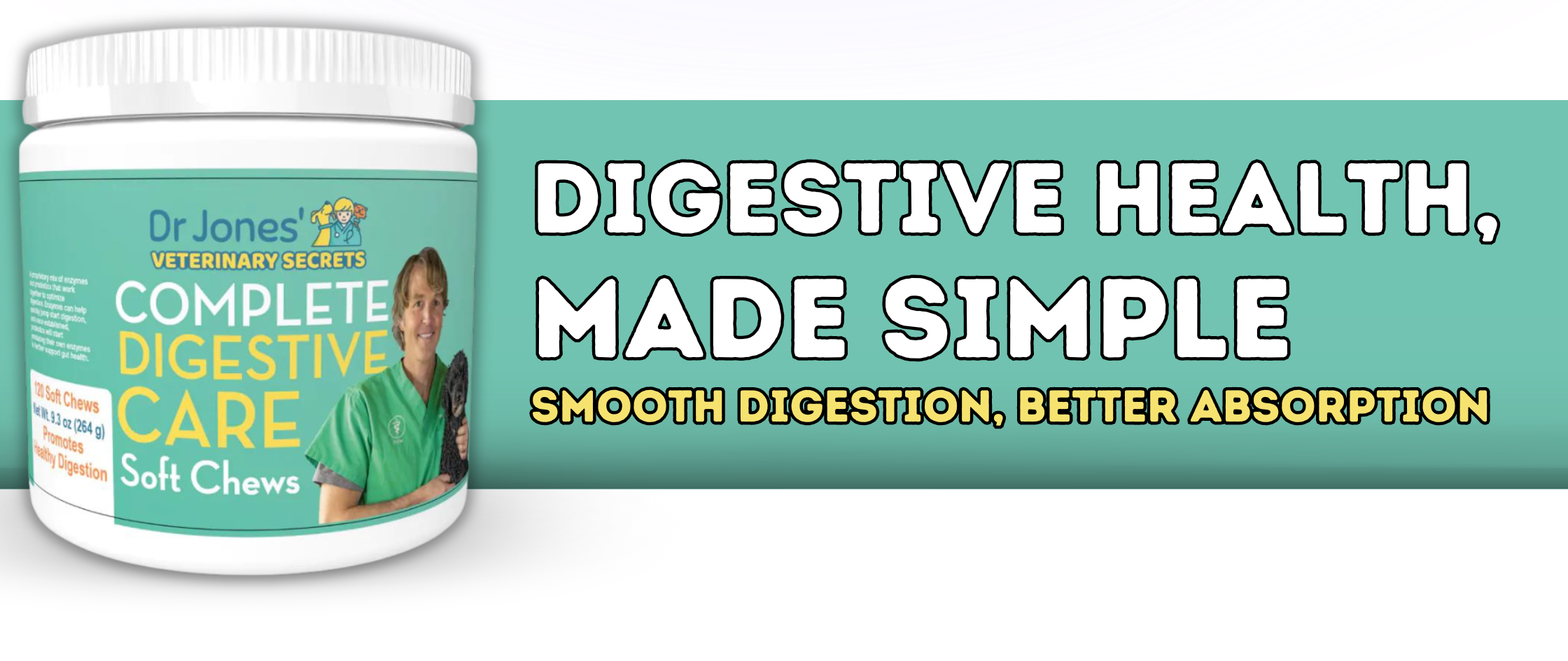Tips to Soothe Your Pet’s Digestive Issues That Actually Work
![]()

Is Your Pet Struggling with Digestive Issues?
Chronic vomiting, diarrhea, and stomach discomfort are more common in dogs and cats than most people realize. Inflammatory Bowel Disease (IBD) can make mealtime stressful for your pet—and frustrating for you. The good news? There are natural ways to support your pet’s gut health and help them feel their best every day.
How Natural Support Can Help
A balanced digestive system is key to nutrient absorption, a shiny coat, and overall vitality. Supporting your pet’s gut isn’t just about easing occasional upset tummies—it’s about promoting long-term wellness and happiness.
Try Dr. Jones’ Complete Digestive Care Soft Chews
One of my favorite solutions for digestive support is Dr. Jones’ Complete Digestive Care Soft Chews. These tasty chews are packed with Digestive Enzymes and 2 Billion CFUs of Probiotics, designed to:
-
Boost digestion and nutrient absorption
-
Support a balanced gut microbiome
-
Promote healthy bowel movements
-
Improve overall vitality and fur quality
Why Probiotics and Enzymes Matter
Digestive Enzymes transform food into easily absorbable nutrients, helping prevent sensitivities and food intolerance. Probiotics not only aid digestion—they strengthen immunity, support mood, and help manage stress through the gut-brain connection.
For pets dealing with IBD, food sensitivities, or general digestive issues, these chews offer comprehensive gut support in a treat they’ll actually enjoy. Healthy digestion truly is the foundation for a happy, vibrant, and playful pet.














After spending a ton of money because my dog has just stopped eating the diagnosis was pseudo pregnancy. Her progesterone levels were very high. They sent us home after she spent two days in hospital with a appetite stimulant that is not working and a antibiotic. We are back to where we started. She is still not eating. I have been giving her pedilyte. Please help!!!!
Since your dog is still off her food after a false (pseudo) pregnancy and only has low-impact support so far, try these natural appetite stimulants and digestive helpers:
Warm and flavor her food—like canned food warmed up with a bit of garlic powder or bouillon—to make it more appealing
Try catnip tincture as an appetite stimulant
Offer chamomile or peppermint tea (1 Tbsp per 10?lb every 4–6?hours) to soothe her stomach and also aid hydration
Add digestive enzymes + probiotics, such as Dr. Jones’s Complete Digestive Care Soft Chews, to support gut health
What do you know about Feline Hyperstesia Syndrome?
Feline Hyperesthesia Syndrome (FHS) is a rare, poorly understood neurological condition in cats. It typically involves:
Symptoms: Sudden episodes of frantic grooming or biting at the lower back or tail base, rippling skin along the spine, dilated pupils, tail chasing, aggression, or frantic running. Cats may appear trance-like during these episodes, which often last just a minute or two
Cause: Unknown—but theories include stress or behavioral issues, seizure activity, or an umbrella of various environmental or neurological triggers
Diagnosis: A diagnosis of exclusion—vets must first rule out allergies, parasites, spinal or neurological problems before considering FHS
Treatment: Often involves a mix of behavioral modification (reducing stress, avoiding triggers), medications (like gabapentin, phenobarbital, amitriptyline, fluoxetine, or prednisolone), and even acupuncture or physical barriers to prevent self-harm
Hello I have just come across your channel and loving the information. I’ve recently adopted a cat from a rescue ..she’s 3 years old, originally came in with her brother but he went to another home sadly. Initially she was bit timid but ate well, loved to play and explore but after couple of ninths I noticed her getting fussier and fussier about eating any cat food ..just human food like chicken or beef. She losing weight and quite thin now. She seems bored and apathetic despite having toys, cat flap to outside, family members trying to cuddle and play etc ..I did wonder if she was grieving her brother and feeling bit depressed.
I decided I’d best get her checked out at the vets who after blood tests to rule out certain serious feline diseases diagnosed IBS. She had a temperature and vet could feel her bowels were swollen. She’d lost 0.5kg in weight. She gave her an anti nausea injection, a steroid that’s supposed to help appetite and an anti depressant? The hope is that when she starts eating better her mood and energy will improve,
Would love to know if you can recommend anything natural for her IBS. I use cbd spray a little around her bed and favourite sleep areas. I just want her to have her best life and she seems so sad ! I’ve had 9 rescue cats in my lifetime and never encountered this before. Thank you
For cats with IBS (or IBD), natural support options include:
Digestive enzymes + probiotics, which help soothe the gut, improve nutrient absorption, and support both digestion and mood
CBD, at about 3?mg per 10?lb, given twice daily, can help reduce inflammation and offer calming gut?brain support
Here are the best supplements we suggest especially the Ultimate Feline FOrmula:
https://shop.veterinarysecrets.com/supplements/for-cats.html
I believe my dog has acid reflux and it seems to bother him mainly at night. I feed him quite early to allow ample time for digestion but I can still hear it come up. He now even prefers to sleep in a big bean bag, I think because it helps to keep it down.
Would you recommend trying the complete digestive care soft chews?
He currently takes a 5 mg daily of Metoclopramide.
The soft chews might offer complementary support, but they are not a substitute for prescribed medications